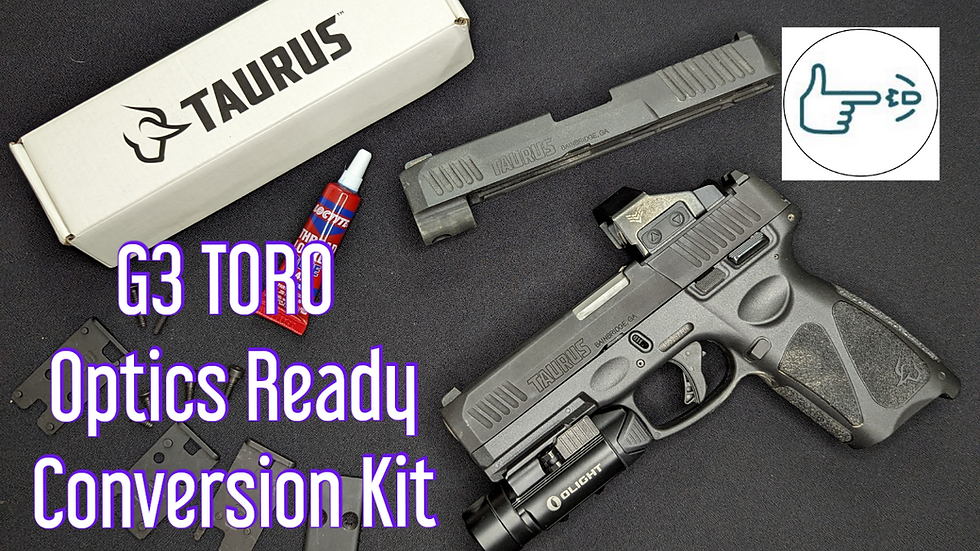Taurus G3 TORO conversion kit
- Robb Ramirez
- Dec 25, 2022
- 3 min read

The G3 is the successor to the popular and successful G2C, and as such it is an evolution or refinement of the design. While the G2C is a compact handgun in terms of size, very similar to a Smith and Wesson Shield, the G3 is noticeably larger and much closer in size to a Glock 17. It is 7.28 inches long, 5.2 inches tall, and 1.2 inches wide. It has a 4-inch barrel with a 1 in 10 twist, and it weighs about 25 ounces unloaded. The G3 has a polymer frame, a stainless steel barrel, and a steel slide. The slide is finished in a matte black Tenifer finish. MSRP for the G3 is $340 dollars, but can commonly be found for less. I got this one for $250 at Brownells.
The on thing that the G3 lacks from the factory is a way to mount an optic. Up until now, an optic cut was not an available option on any G3. This changed with the introduction of the TORO models of the G3 and G3C, which come with a standard optic cut and adapter plates. Taurus now offers this TORO cut slide as a standalone upgrade to standard G3 and G3C models, making it a very easy way to upgrade an existing G3 like ours. MSRP for this TORO kit is about 200 dollars, but it sometimes goes on sale for as little as 120 dollars, which is what I got it for.
The TORO kit comes from Taurus complete and basically ready to drop onto a G3. Opening the box we have the slide itself, as well as some adapter plates and an allen wrench. The slide is finished in that same matte black finish as the standard G3 slide, so it shares the same benefits and drawbacks as that factory slide. The optic cut is covered by the included cover plate, and Taurus also includes hardware to use when installing an optic.
The standout thing about this kit is that the slide is shipped already assembled, with the striker system already installed and ready to go. This saves the user from the trouble of having to pull these parts out of their existing slide to transfer them over, which makes this upgrade MUCH easier. All that needs to be done is it to take the barrel and recoil system out of the existing slide and drop them into the TORO slide. After that, its ready to have an optic mounted and then put back onto the frame.
Mounting that optic consists of selecting the correct mounting plate for the optic, mounting that plate to the TORO slide, and then mounting the optic to the plate. The plates sit securely on the slide, and are further held in place by the cutouts that Taurus has machined into them that interface with corresponding areas on the slide. The plates seem to be pretty good quality, made out of steel, and Taurus is nice enough to throw in plates for all popular optic footprints right in the box.
Once everything is mounted up and torqued down, I can say that the system is very solid and seems like it can stand up to some tough use. I used the hardware that Taurus includes to mount up this Swampfox Justice that you may remember from the PDP videos. Even with the added thickness of the Ironsides shield, the screws look to have a very healthy amount of engagement into the slide, which makes me feel good that this won't work its way loose even under hard use.
Overall, for the 120 dollars I paid, I think that this is a very solid upgrade. In terms of cost, it's very comparable to having the slide sent out to a machine shop to be milled for an optic, but comes with the benefit of being able to keep the factory slide as an easy way to flip back and forth between setups. The only thing that it lacks is cowitness sights, which I'm going to remedy in another article coming up soon. That's all I have for you this time, so until next time, stay safe!